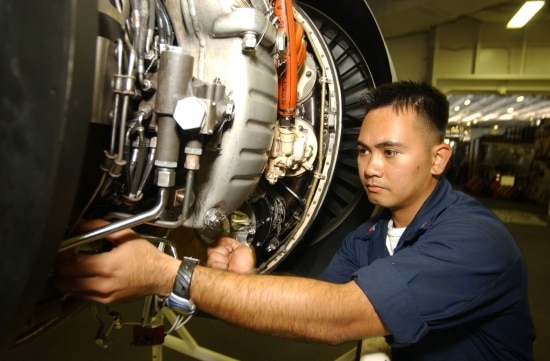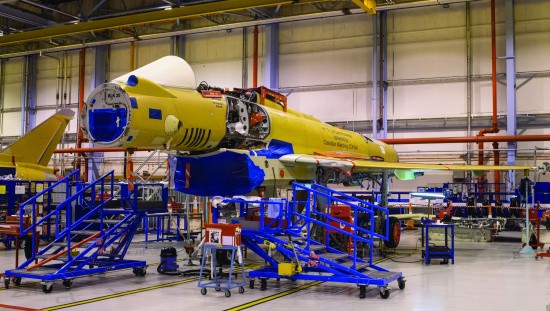One of the ways in which they can do is to put an employee forward for a Master's degree level apprenticeship, or Mastership, offered at Cranfield University.
The defence industry has been the first to develop and run such Masterships, addressing the need for high-level systems engineering skills. The 'Mastership' programme has been running at Cranfield since the start of 2016, designed and used among members of the Defence Growth Partnership.
The Student Engineer got in contact with Dr Emma Sparks, head of Centre for Systems Engineering at Cranfield University, to find out more.

What is a Mastership?
It’s a degree apprenticeship at level 7 - equivalent to a Master’s degree qualification.
Why has Cranfield developed its Masterships course?
The Masterships will form a portfolio of master’s level degree apprenticeships offered by Cranfield in partnership with business and industry to create the next leaders in engineering, technology and management. The aim will be to work alongside industry to produce the ’standards’ for a range of sectors we’re specialist in - starting with roles in engineering, management and aerospace.
Who is it aimed at?
The Masterships are aimed at employees with experience as well as those who have followed an academic trajectory. This could be someone who is mid-career, changing their domain of expertise or having done a lower level apprenticeship or undergraduate degree.
In what ways are Masterships any different to an employee doing day release to study for a higher education qualification?
Masterships - like all apprenticeships - are employer-led and the focus of activity is on work-based learning. The standards provide a framework of core skills, knowledge and behaviours necessary for performing a range of career roles to a high level - and within the context of their organisation. In other words, employers retain control. Organisations are able to leverage higher-level study in the specific terms of someone’s actual day job or future day job, ensuring learning is applied immediately for maximum impact.
The individual participants work towards an individual competency profile aligned to the standard; gathering a portfolio of evidence of their knowledge and skills and how they are being applied. The vocational activities are devised in agreement between the employer and the apprentice, making sure the work has a spine of academic rigour, are tailored to both the learner and business need, provide a link between current and future career roles, and have the potential to provide some kind of measurable impact.

How does a prospective student get onto the course?
Initially their employer needs to select them for a Mastership, and provide funding (as below). Participants follow the same admissions process used for traditional postgraduate students, and there are the same equivalent requirements in terms of qualifications and/or experience.
What sector specific specialisms does Cranfield bring to Masterships?
Systems Engineering has been the first Master’s level apprenticeship, developed under the sponsorship of the Defence Growth Partnership. The employer-led Trailblazer Group is currently chaired by Qinetiq and includes members such as Atkins and BAE Systems. Systems engineering is a good example of an area where there’s an identified - and major - skills gap, and demand from across sectors such as defence, transport, energy and healthcare.
Cranfield has expertise across the spectrum of engineering-related sectors, from defence and aerospace to energy, manufacturing, transport and water. The University is looking to be part of the Trailblazer groups with industry to create more standards at level 7 for specific career roles.
In more general terms, Mastership students are integrated with Cranfield’s experienced and international student body and are eligible to join our 60,000 strong worldwide alumni network.
What duration do Masterships have?
Using the Systems Engineering Masters Apprenticeship as an example, the typical length of the apprenticeship is five years, with three of those normally associated with academic study on a part-time basis. Other Masterships under development may vary in duration.
How much time is spent at Cranfield as part of the course?
With the Systems Engineering Mastership, for example, 60 per cent of the time spent by employees is on work-related projects and activity, 40 per cent on the academic content. The academic component is normally completed over the course of three years part time.

Does a Mastership require any residential study time?
The academic component is likely to include some residential time. This may be up to four weeks spread across an academic year.
How are Masterships funded?
Wholly by the employer. Apprenticeships will come under 15 funding bands ranging from £1,500 to £27,000. Employers will be able to use government funds for training costs up to that limit; beyond that, they will have to ‘top up’ themselves. Non-levy paying employers (those with a pay bill of less than £3m) will make a 10 per cent contribution to the cost of training, with the government covering the other 90 per cent.
In what ways will a Mastership make an employee more valuable to a company?
A Mastership signals a strong two-way commitment. The employer invests in an employee’s future, equipping them with necessary skills and knowledge to a very high level. The employee will, in principle, therefore have a very specific value in terms of what they bring to their role, have important experience from addressing current organisational challenges through project work, and have high potential for progression.
Given the fluidity of the jobs market and the direction people want to take their careers, will the skills learned on a Mastership be transferable between sectors, and will prospective employers recognise this?
The Masterships are founded on an academic core - Cranfield’s responsibility - which delivers the transferable skills and knowledge. The applied learning is arguably as useful for other potential employers.
Thanks Emma!

Report highlights significant impact of manufacturing on UK economy
Note to Evil Villain/Dave 2020. Thatcher was PM for _11_ years, from 1979 to 1990 so no one under the age of 34 was even born when she left office....